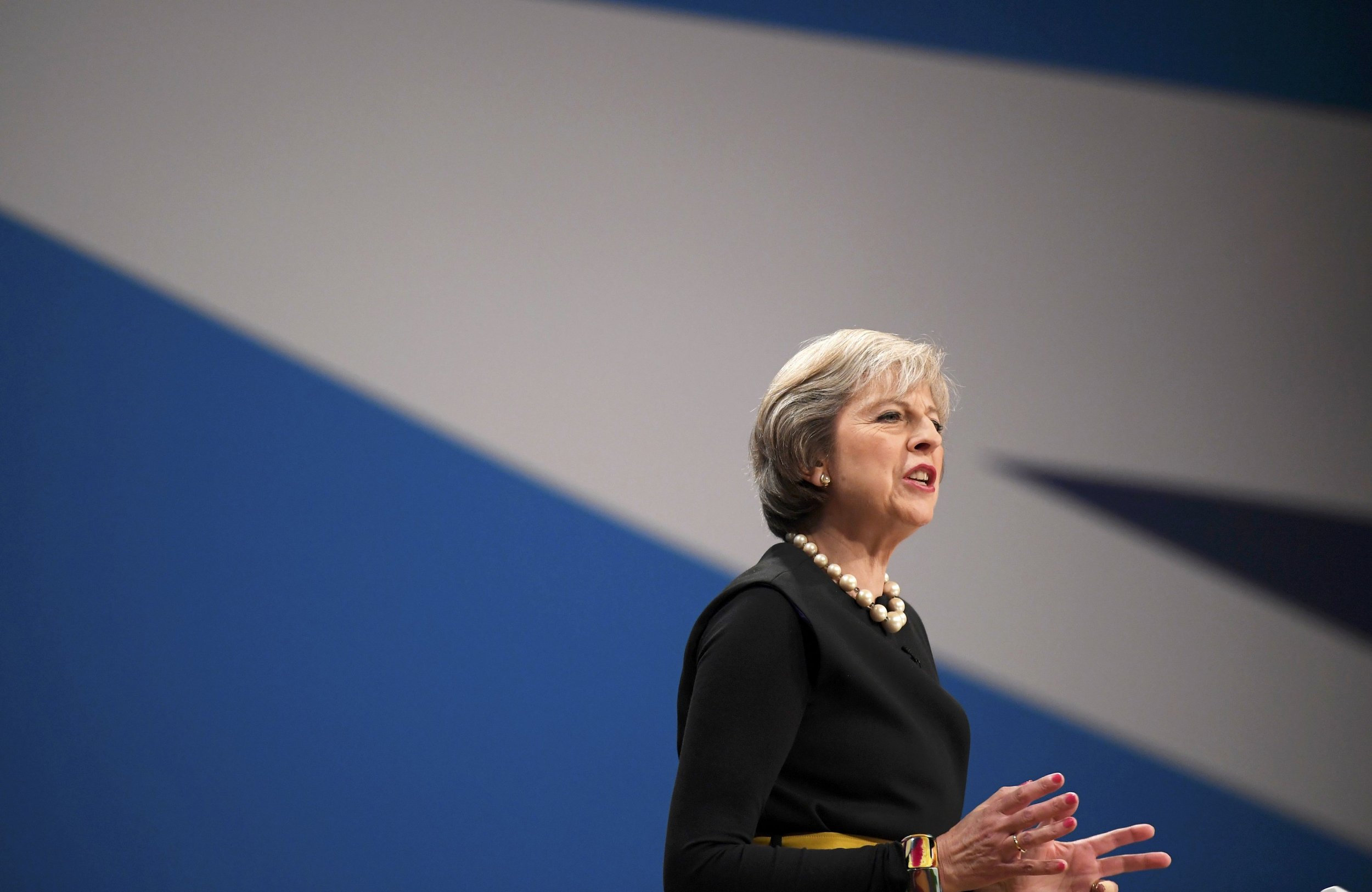
Britain will trigger the formal divorce process from the European Union by the end of March 2017, Prime Minister Theresa May said on Sunday.
Following are key parts of May's speech to the Conservative Party Conference.
ON BREXIT
"The referendum result was clear. It was legitimate. It was the biggest vote for change this country has ever known. Brexit means Brexit—and we're going to make a success of it.
"Everything we do as we leave the EU will be consistent with the law and our treaty obligations, and we must give as much certainty as possible to employers and investors. That means there can be no sudden and unilateral withdrawal: We must leave in the way agreed in law by Britain and other member states, and that means invoking Article 50 of the Lisbon Treaty.
"Having voted to leave, I know that the public will soon expect to see, on the horizon, the point at which Britain does formally leave the European Union."
ON ARTICLE 50
"We will invoke Article 50 no later than the end of March next year."
It "is not up to the House of Commons to invoke Article 50, and it is not up to the House of Lords. It is up to the government to trigger Article 50, and the government alone.
"Those people who argue that Article 50 can only be triggered after agreement in both Houses of Parliament are not standing up for democracy, they're trying to subvert it. They're not trying to get Brexit right, they're trying to kill it by delaying it."
ON EU LAW
"We will soon put before Parliament a Great Repeal Bill, which will remove from the statute book—once and for all—the European Communities Act.
"This historic bill—which will be included in the next Queen's Speech—will mean that the 1972 Act, the legislation that gives direct effect to all EU law in Britain, will no longer apply from the date upon which we formally leave the European Union. And its effect will be clear. Our laws will be made not in Brussels but in Westminster. The judges interpreting those laws will sit not in Luxembourg but in courts in this country. The authority of EU law in Britain will end.
"As we repeal the European Communities Act, we will convert the 'acquis'—that is, the body of existing EU law—into British law. When the Great Repeal Bill is given Royal Assent, parliament will be free—subject to international agreements and treaties with other countries and the EU on matters such as trade—to amend, repeal and improve any law it chooses. But by converting the acquis into British law, we will give businesses and workers maximum certainty as we leave the European Union.
"The same rules and laws will apply to them after Brexit as they did before. Any changes in the law will have to be subject to full scrutiny and proper Parliamentary debate. And let me be absolutely clear: existing workers' legal rights will continue to be guaranteed in law—and they will be guaranteed as long as I am prime minister."
ON HARD AND SOFT BREXIT
"There is no such thing as a choice between 'soft Brexit' and 'hard Brexit.' This line of argument—in which 'soft Brexit' amounts to some form of continued EU membership and 'hard Brexit' is a conscious decision to reject trade with Europe—is simply a false dichotomy. And it is one that is too often propagated by people who, I am afraid to say, have still not accepted the result of the referendum."
ON BRITISH RELATIONS WITH EU
"It is not, therefore, a negotiation to establish a relationship anything like the one we have had for the last 40 years or more. So it is not going to a 'Norway model.' It's not going to be a 'Switzerland model.' It is going to be an agreement between an independent, sovereign United Kingdom and the European Union."
ON IMMIGRATION AND EU MARKETS
"I know some people ask about the 'trade-off' between controlling immigration and trading with Europe. But that is the wrong way of looking at things. We have voted to leave the European Union and become a fully-independent, sovereign country. We will do what independent, sovereign countries do. We will decide for ourselves how we control immigration. And we will be free to pass our own laws.
"I want that deal to reflect the kind of mature, cooperative relationship that close friends and allies enjoy. I want it to include cooperation on law enforcement and counter-terrorism work. I want it to involve free trade, in goods and services. I want it to give British companies the maximum freedom to trade with and operate in the single market—and let European businesses do the same here. But let me be clear. We are not leaving the European Union only to give up control of immigration again. And we are not leaving only to return to the jurisdiction of the European Court of Justice."
ON GLOBAL TRADE
"It was a vote for Britain to stand tall, to believe in ourselves, to forge an ambitious and optimistic new role in the world.
"Countries including Canada, China, India, Mexico, Singapore and South Korea have already told us they would welcome talks on future free trade agreements. And we have already agreed to start scoping discussions on trade agreements with Australia and New Zealand."
Uncommon Knowledge
Newsweek is committed to challenging conventional wisdom and finding connections in the search for common ground.
Newsweek is committed to challenging conventional wisdom and finding connections in the search for common ground.
About the writer
To read how Newsweek uses AI as a newsroom tool, Click here.








